Piloting co-operative care in London: the final quarter
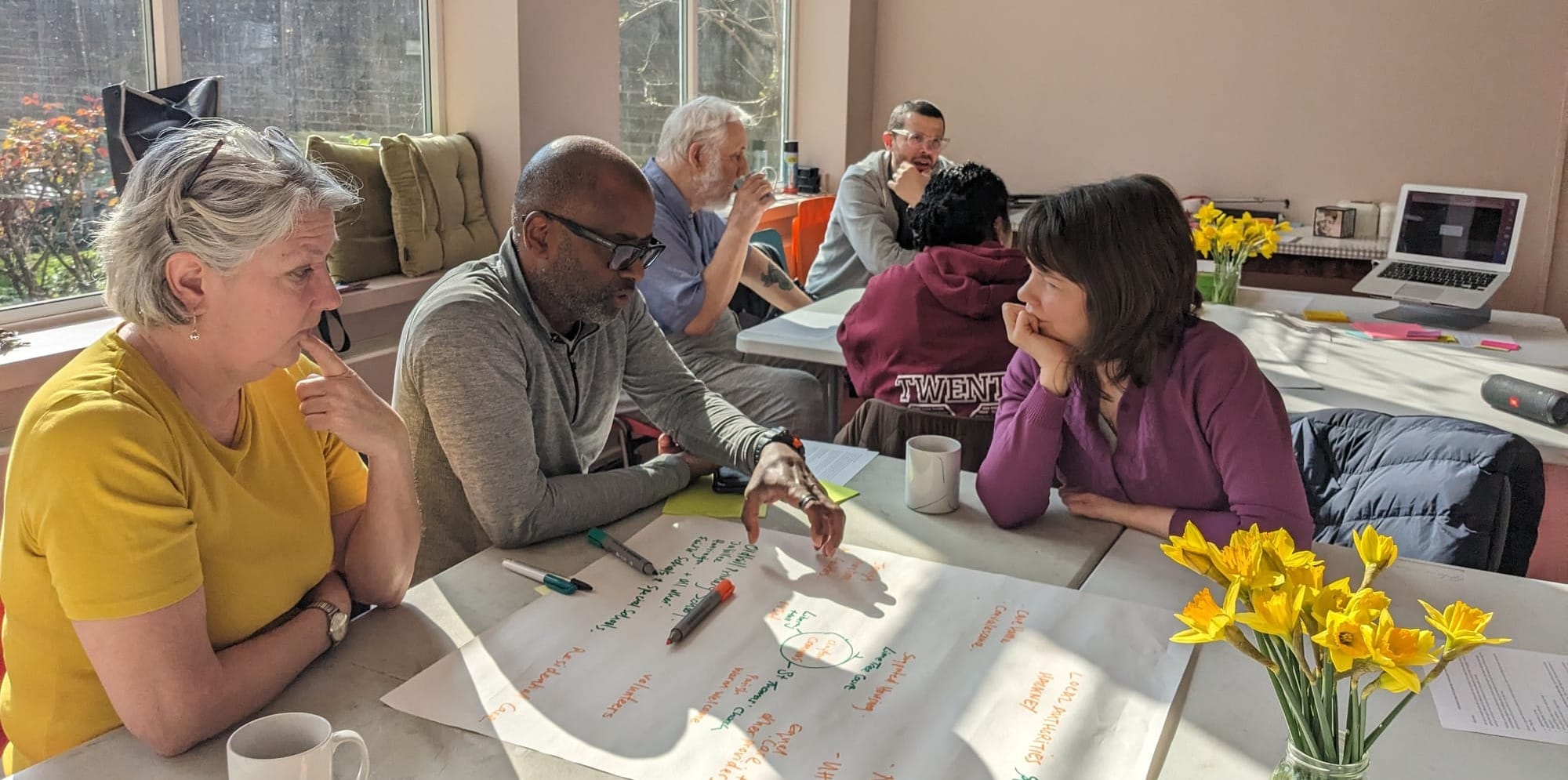
As we enter the last quarter of our LOTI-funded pilot of a care commons in Clapton, our team is shifting focus from recruitment, team building and community mapping to producing a service specification, evaluation framework and playbook for Commons-based care.
Much of our work on the latter is informed by our experience in building this service with the communities we seek to support. In this blog, I will summarise some of these experiences and explain what work remains to be done.
Recruitment
Our core team in Clapton had focused on recruiting locally to support locally, with face-to-face recruitment events at a local school, community spaces and on Clapton Common itself as well as flyering in local shops and posting in local community groups on social media.
The response was promising: from the beginning of our recruitment drive we have engaged more than 25 people from the local community, some experienced carers and others new to care. Many were interested not only in the more reasonable rates we offer to self-employed workers but also in the community connection, caring for people in your own neighbourhood.
The greatest challenge to translating this initial interest into Equal Care workers ready to be matched with a local community member was the fact that we could not guarantee people enough working hours at the outset. Our strategy of starting small and growing slowly, means any care workers starting with us need to be able to increase their number of hours over time gradually. To address the challenge we have begun building teams in partnership with a second trusted home care provider Sunday Care Therapy who are interested in our Commons model of care.
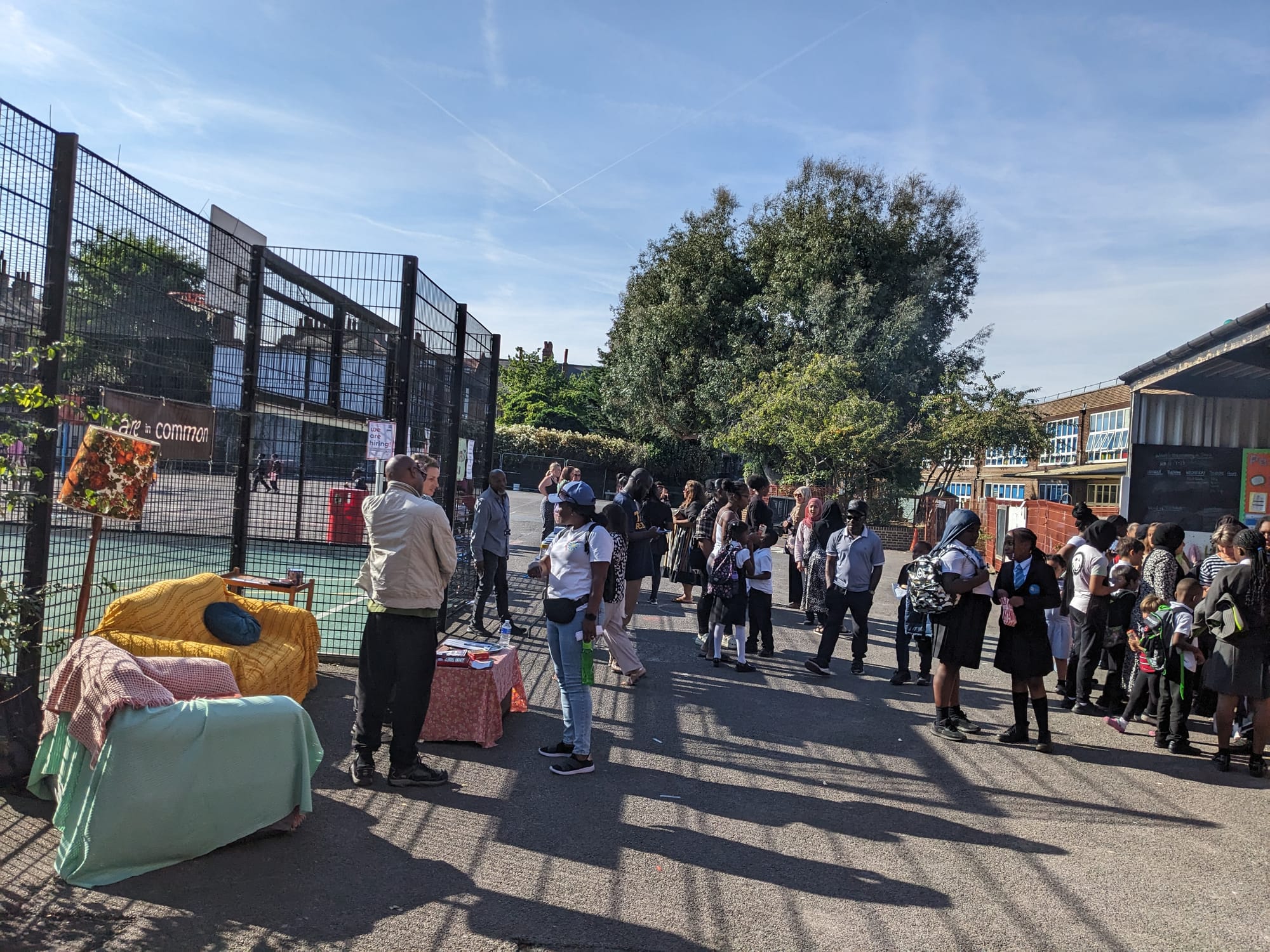
Team-building
We pledged to build five teams over the course of the project. In Equal Care Co-op each team supports one person and is made up of our care workers, as well as any friends, family and/or volunteers the team owner chooses. Team building started with mapping people's existing care and support networks and identifying members of people’s existing support networks who could join an Equal Care team and work in partnership with our care workers. A care map can also help us to integrate our service into someone’s existing care and support networks.
Example of a personal care map
For more information on Care mapping see our blog here.
Three of the four Team Owners needed to move to direct payment to receive care from us. Unfortunately, the timeline for this process has not aligned well with the milestones we initially mapped for a 12-month project. Moving some Team Owners over to direct payments can take up to four months.
Team-building also included making referrals with local volunteer and befriending services such as Compassionate Neighbours, East London Cares (who unfortunately closed down halfway through the project) and Volunteer Centre Hackney. We now have one volunteer member in a team and expect to have two further volunteers joining teams by the end of the project.
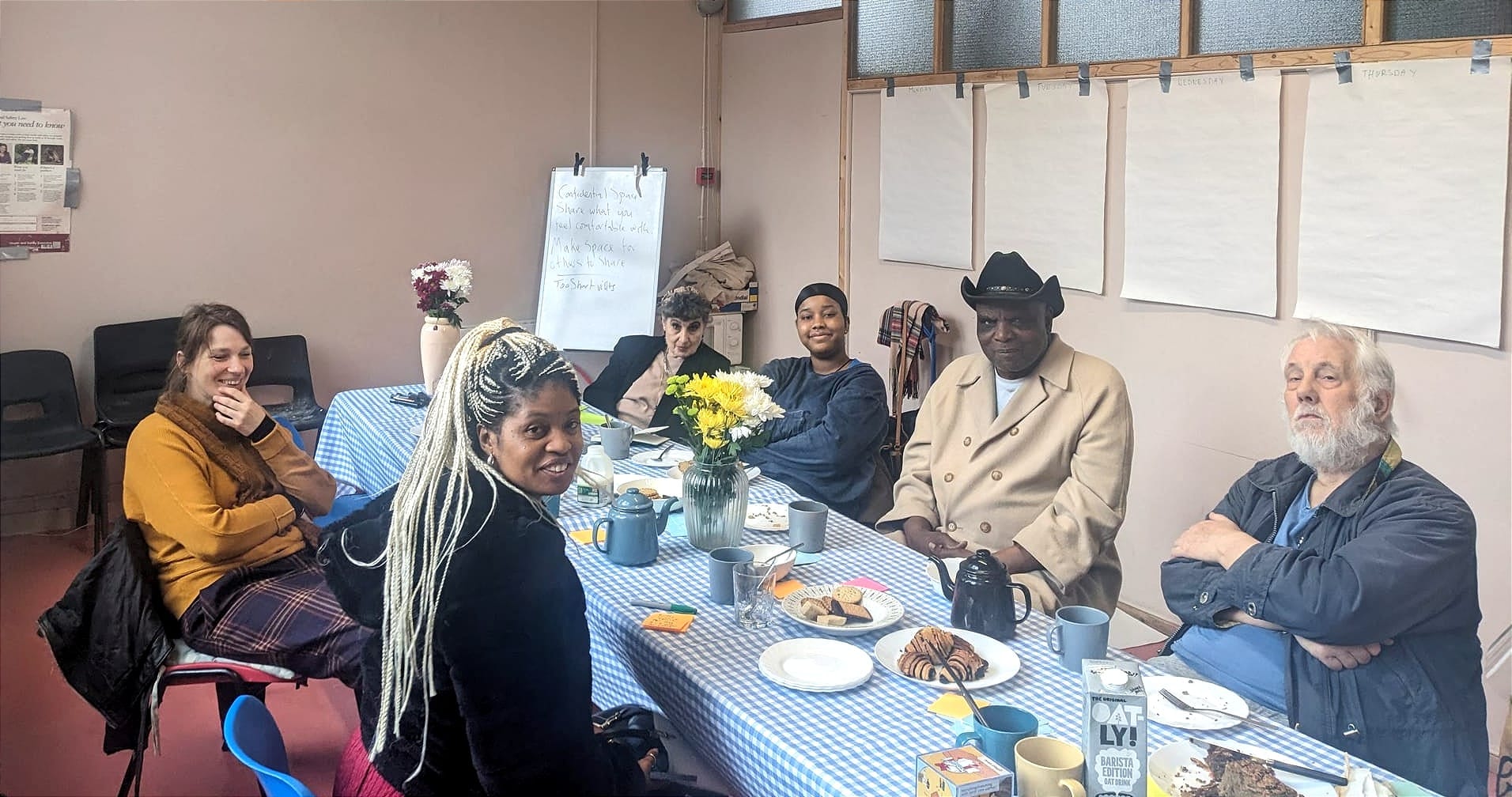
The profound challenges we have faced with recruitment and the time involved in transitioning people to direct payments means we will be achieving our goal of setting up five teams in the last quarter of the project. Whilst progress has been slower than anticipated we are moving towards our goal of setting up the five teams that integrate informal and formal care networks. However, given the challenges we have faced in recruitment, team building and establishing local authority rates that put us on a sustainable footing we have decided to stop team building once we have reached this goal. Our partnership with Sunday Care Therapy will help secure the sustainability of these five teams in the longer term.
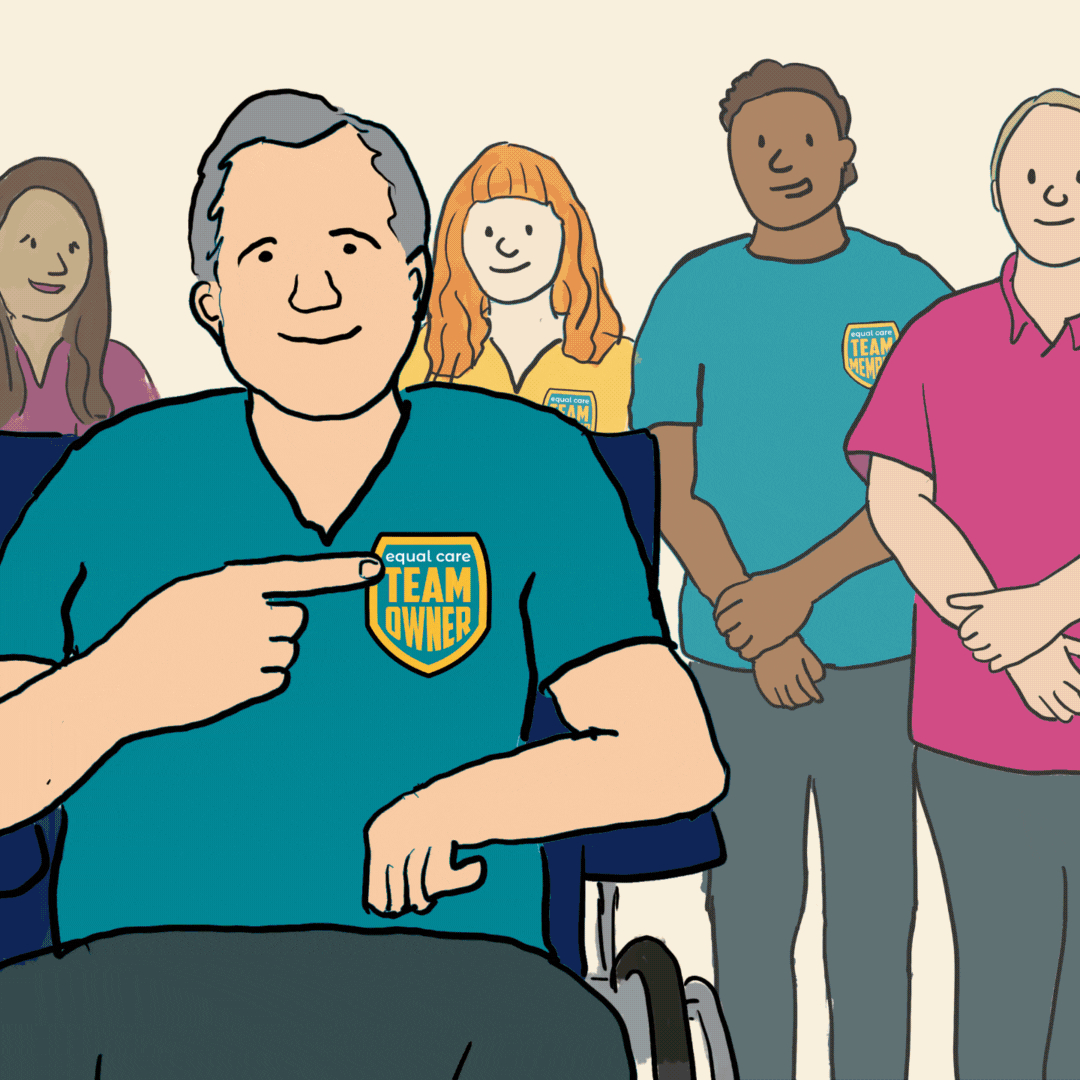
Community Mapping
Using Kumu, a powerful system mapping platform, we are creating an interactive map that makes the often invisible grassroots networks of care and support more visible and accessible to people giving and receiving care.
This map is of relationships located in neighbourhoods around Clapton Common. Everyone on this map shares a common purpose related to care; “Taking care of,” “Caring for,” or “Caring about” local people's well-being and experience of care and support. Our five teams appear as valued community resources alongside other community groups and services that are enriching this local landscape of care and support. We will be using this map to:
- Generate more cooperative connections between local groups and organisations and facilitate the sharing and pooling of resources for their common good.
- Enable local community groups to enrich the quality of lives of members of Equal Care teams and for those teams, in turn, to enrich the local landscape of care and belonging
- Enable a local gift economy that promotes individual and community well-being more visible and accessible
- Help people spend more of their money on care within the local community
- Promote asset-based community development in the Upper Clapton neighbourhoods by matching local resources to local needs and aspirations
- Measure the social impact of our pilot in Commons-based care on the local community.
Care in Common Community Network Clapton
Whilst we primarily built this map for internal use, feedback from various stakeholders suggests that other community groups and services would benefit from using the mapping methodology and tools we have. We will be working with stakeholders based in Clapton and other neighbourhoods in London to develop this work further. We hope that we can develop a more accessible interactive map that can be used by more members of the network being mapped.
For more information on the mapping work and methodology see our blog here.
Service Specification
We firmly believe that innovation in care provision necessitates innovation in commissioning. That's why we integrated a Care Commons Service Specification into the LOTI Project. In social care, a service specification acts as a blueprint, setting minimum requirements and expectations for care services. It ensures consistent standards across providers and guides improvements while respecting service users' rights and dignity. Beyond these immediate benefits, service specifications can also contribute to broader transformations within the social care landscape. They can stimulate innovation by encouraging providers to explore new approaches and technologies, ultimately leading to more effective, personalised care. Furthermore, they can support the development of a heterogeneous market by promoting the development of different models of care, as well as forms of ownership and provision.
Traditionally, care provision has been perceived as a commodity, managed by centralised systems and processes. In contrast, rooted in the intrinsic value of relationships and collaborative systems, the concept of the Care Commons redefines care as a common pool resource, community-managed asset and collective responsibility. The development of a Service Specification for Commons-based care aims to broaden service offerings to include unconventional care methods and utilise technology for improved connectivity. Through advocating multi-stakeholder governance and fostering collaboration, adaptability, and knowledge sharing, this initiative strives to enhance care provision's effectiveness and sustainability within communities. By integrating formal care with informal networks at a hyperlocal level, it lays the groundwork for a more dynamic and responsive social care landscape, prioritising community co-production in service delivery and ongoing evaluation and governance. This Service Specification signifies a fundamental departure from traditional approaches, signalling a shift towards a more inclusive, collaborative, and community-driven approach to social care provision. It not only establishes clear care delivery standards but also acts as a catalyst for transformative change, paving the way for a fairer and more sustainable future for all stakeholders in the social care ecosystem.
Evaluation Framework
In any innovative endeavour, the ability to measure performance and demonstrate effectiveness is paramount. As we pilot a new model of home care, it's essential to establish a robust evaluation framework. This framework serves multiple crucial purposes: firstly, it provides a means to quantify our impact and create a solid evidence base validating the efficacy of our approach. This evidence is invaluable, particularly when engaging with sceptics wedded to traditional methods. Secondly, the evaluation framework acts as a tool for continual improvement, allowing us to identify strengths, weaknesses, and areas for enhancement as we navigate the complexities of implementing a novel care paradigm. In essence, it's not just about proving ourselves to sceptics, but also about testing our own assumptions, checking we are indeed achieving what we are setting out to do and, of course, refining and optimising our approach to better serve those in our care and the wider community.
We kickstarted the development of the evaluation framework by revisiting our theory of change with community members in Clapton to make sure we measure what matters to people. The workshop was attended by care workers, Team Owners, volunteers, and members of local community organisations and services and researchers from UCL.
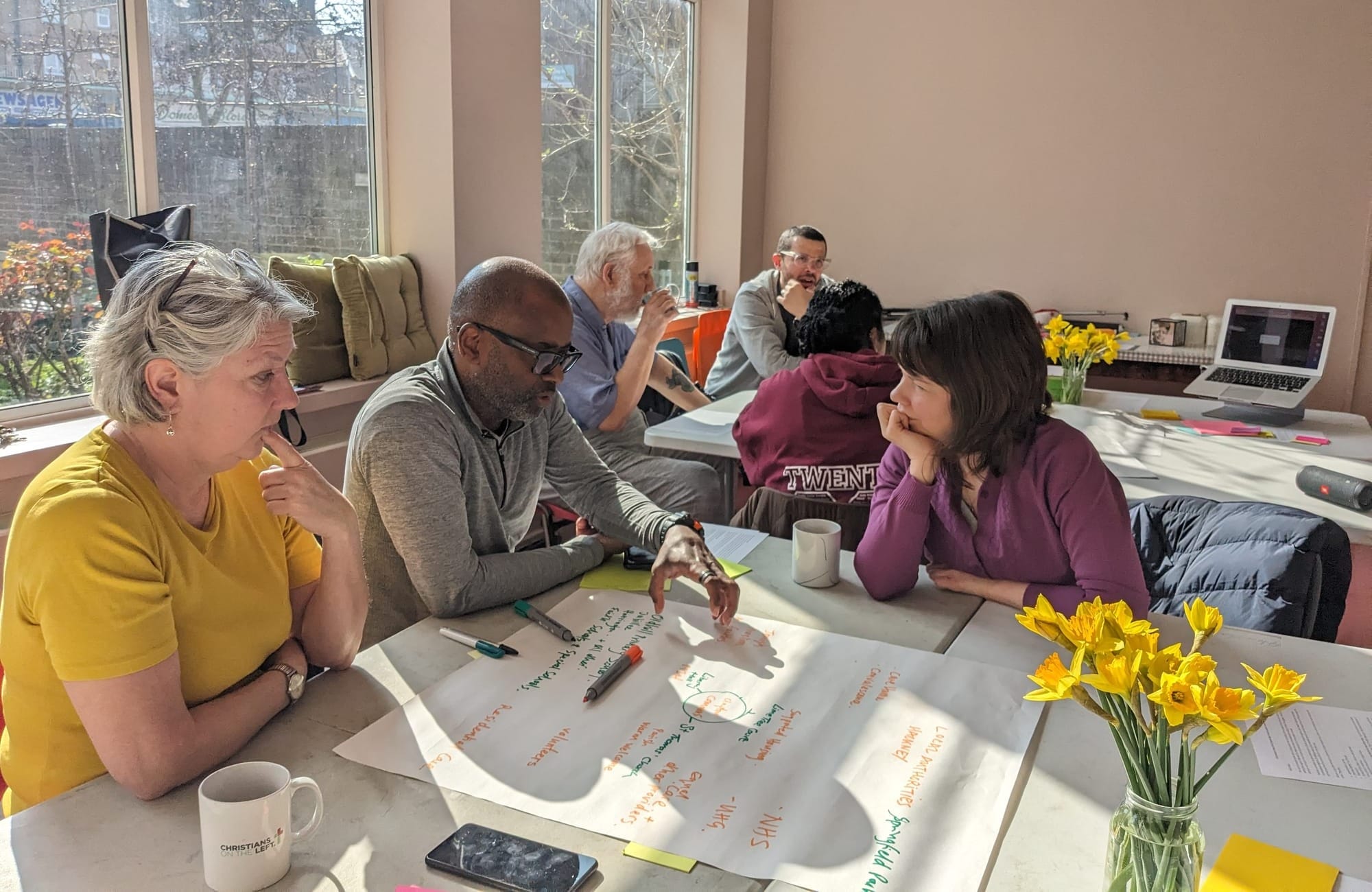
We are currently testing the surveys we have developed to measure the lived experience of the service from multiple perspectives. Researchers in our team are currently interviewing community members about their experience of co-production and its impact on individual quality of life and local care networks. We have begun assessing the scalability of this model with researchers at the Department of Town Planning, UCL and exploring how best to measure its social value. Meanwhile, we are working with our platform team to identify what passive data we are collecting that can provide a richer picture of the service performance.
By project completion, the evaluation framework will encompass a variety of tested approaches and tools, facilitating the measurement of cooperative care. It will prioritize capturing the full spectrum of stakeholders' lived experiences of the service and quality of life, as opposed to the conventional metrics typically utilized in traditional care services.
The Playbook
The playbook aims to equip both local authorities and community groups with practical tools and guidance for developing cooperative home care services. For local authorities, it offers a self-assessment tool to gauge the feasibility of establishing such services within their jurisdiction, while also identifying key financial, regulatory, and structural barriers. Additionally, it outlines strategies for collaborating with local community groups in the co-production of these services, emphasising ongoing involvement in service delivery, evaluation, and governance. Specific attention is given to addressing cultural and ethnic considerations and supporting identity-based circles. For community groups, the playbook provides resources for assessing financial viability, identifying local barriers and opportunities, and mapping pathways to service development using the Equal Care’sdigiytal platform. It also highlights factors for minority racialised community groups to consider when engaging in circle development. Overall, the playbook offers a comprehensive framework to foster the successful establishment of cooperative home care services tailored to the needs of diverse communities.
Innovation toolkit
Taken together, the service specification, evaluation framework, and playbook provide local authorities with a comprehensive suite of tools and resources to enable innovation and system change in social care. The service specification embodies a shift towards a hybrid service that integrates the best of formal and informal systems of care and promotes multi-stakeholder governance. The evaluation framework ensures that outcomes are measured based on what matters most to communities, facilitating ongoing improvement and scalability assessment. Meanwhile, the playbook offers practical guidance for navigating barriers and opportunities in cooperative home care development, fostering collaboration and addressing diverse community needs. By integrating these components, local authorities can effectively reimagine care provision as a community-managed asset, enhancing its effectiveness and sustainability within diverse communities.
An abridged version of this blog post was previously published by the London Office of Technology and Innovation here. Our findings and outcomes will be looked at in more depth at a forthcoming 'show and tell' with the LOTI Community, on a date to be announced soon.

